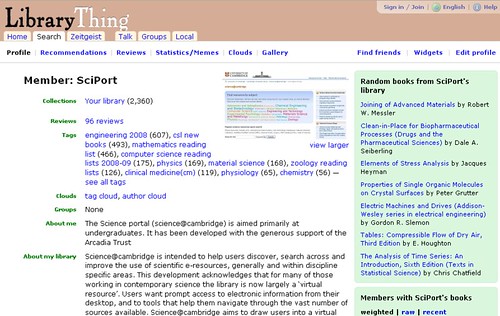
That is, a feed from - and link to - a Cambridge Library new science books account on LibraryThing - SciPort:

I'm not sure how the Library Thing account is kept up-to-date? Does LibraryThing support synching somehow? As science@cambridge was set up under the aegis of the Arcadia project (I think?), somebody on the team must know?! ;-)
I have to admit, though - this willingness to engage with new ideas has really impressed me...:-)
[Note - the rest of this post is concerned with the visual - the surface appearance of the library catalogue front end, not is search tools, indexing and metadata capabilities, etc. If OPAC front ends were designed with web standards in mind, a lot of the shiny stuff could be added with a bit of re-skinning... But in the main, their HTML is horrible... Also remember that I come from the rapid prototyping camp - could we get something up and running in a day or two?]
So what does LibraryThing offer? Firstly, you can add books to your account, in order to maintain a collection of records about books you own (or presumably, have read). Secondly, you can search through user's collection:

The results are also available in a cover based view:

I wonder how hard it would be to add a coverflow view - e.g. as 'pure coverflow':

or as a more traditional carousel:

(Certainly on the iPod Touch, I find the flickable cover flow interaction lets me skim through album covers until I find the one I want to be very effective, efficient, and maybe even more pleasant than a click based interaction?)
The records for each book are centrally held, which makes sense, and user stats are aggregated across the public users of the LibraryThing site:

The "Buy, borrow or swap" column on the right hand side is interesting... What if an institution hosted its own version of LibraryThing, gave all the patrons an account (and also everyphysical library) and books were tracked that way? What if Libraries that had a book available for loan advertised that book via the Member Giveaway, and a patron that had borrowed a book could also loan it on via the Member Giveaway facility, an approach not unlike the Bookcrossing idea, I suppose?
An alternative social front end to the OPAC can be put together using Scriblio/WP-OPAC. Joss WInn at Lincoln is soliciting thoughts on a hosted version of Wordpress/Scriblio that Libraries could use to set up their own Wordpress catalogue frontends without too much grief or technical expertise: Open Education: Talis Incubator Proposal
Imagine that JISC, Talis or Eduserv offered such a platform to UK university libraries. It could be a service, not unlike wordpress.com, where authorised institutions, could self-register for a site and easily import their OPAC, apply a theme, tweak some CSS, choose from a few useful plugins, and within less than a day or two, have a branded, cutting-edge search and browse interface to their OPAC, running under their own domain.
Again, Scriblio offers most of what you'd expect from a visual, social front end to a catalogue - covered illustrated results:

Location information, some desciptive text and category labels:

A bit of metadata, and some related works:

(I think it's important not to underestimate related works - part of the joy of a physical library is the role of serendipity in finding books that are related to the one one you thought you were looking for, and that might actually suit your needs better...)
Being Wordpress based, you get an RSS vresion of the results page for free, if you want it: RSS version of Scriblio book information page.
And that's maybe a point worth finishing on... As well as social and visual features, these informal book catalogue solutions expose simple machine readable interfaces that third parties can build on. The catalogue layer is a representation surface that supports search and discovery not just on the Library website, but also potentially on third party sites, and using third party skins.
If you want to keep control of you data, whilst maximising its effective web exposure, you have to share it. Otherwise people will grab a local copy to do with as they will, and/or remain oblivious to your site completely...



No comments:
Post a Comment